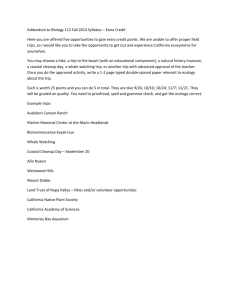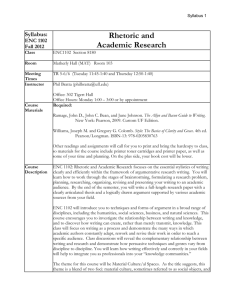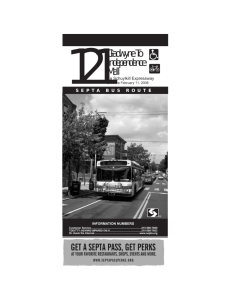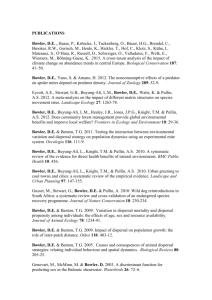Population and Community Ecology (Thiagarajan)
advertisement
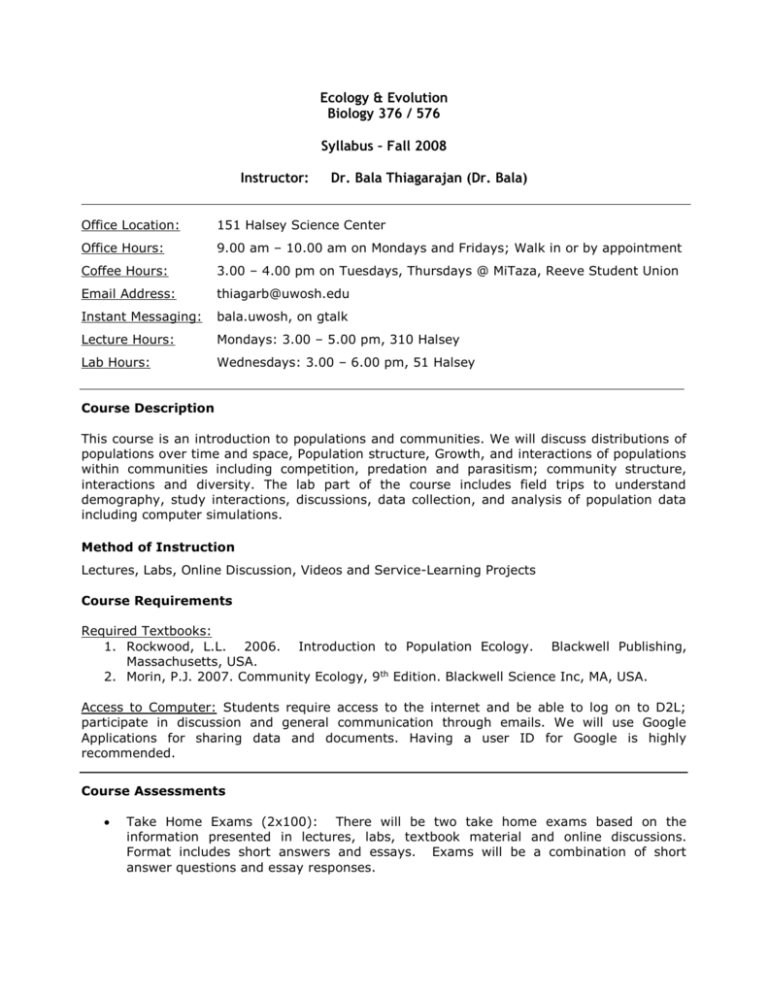
Ecology & Evolution Biology 376 / 576 Syllabus – Fall 2008 Instructor: Dr. Bala Thiagarajan (Dr. Bala) Office Location: 151 Halsey Science Center Office Hours: 9.00 am – 10.00 am on Mondays and Fridays; Walk in or by appointment Coffee Hours: 3.00 – 4.00 pm on Tuesdays, Thursdays @ MiTaza, Reeve Student Union Email Address: thiagarb@uwosh.edu Instant Messaging: bala.uwosh, on gtalk Lecture Hours: Mondays: 3.00 – 5.00 pm, 310 Halsey Lab Hours: Wednesdays: 3.00 – 6.00 pm, 51 Halsey Course Description This course is an introduction to populations and communities. We will discuss distributions of populations over time and space, Population structure, Growth, and interactions of populations within communities including competition, predation and parasitism; community structure, interactions and diversity. The lab part of the course includes field trips to understand demography, study interactions, discussions, data collection, and analysis of population data including computer simulations. Method of Instruction Lectures, Labs, Online Discussion, Videos and Service-Learning Projects Course Requirements Required Textbooks: 1. Rockwood, L.L. 2006. Introduction to Population Ecology. Blackwell Publishing, Massachusetts, USA. 2. Morin, P.J. 2007. Community Ecology, 9th Edition. Blackwell Science Inc, MA, USA. Access to Computer: Students require access to the internet and be able to log on to D2L; participate in discussion and general communication through emails. We will use Google Applications for sharing data and documents. Having a user ID for Google is highly recommended. Course Assessments Take Home Exams (2x100): There will be two take home exams based on the information presented in lectures, labs, textbook material and online discussions. Format includes short answers and essays. Exams will be a combination of short answer questions and essay responses. Online Discussions (14x20): We will have an online discussion every other week on, and the article for discussion will be announced one week in advance for you to prepare. Discussions will emphasize reading primary literature, and summarizing the material. You are encouraged to select the papers based on your particular interest. Lab Reports (4x25): Formal lab reports (Abstract, Introduction, Methods, Results, Discussion, Literature Cited, Tables, and Figures) on experiments and data analysed in the lab, due one week after the completion of the project. We will discuss the objectives, experimental design and statistical analyses during lab hours. Students can work in small groups on the experiment, but need to turn in individual reports. Short Assignments (60): These will focus on analyzing data and interpreting results. Graduate Students will have additional assignments. Service-Learning project (100): Participate in a project / study in collaboration with a community agency (example – DNR) and write a paper on your learning experience. Grading: There are evaluations worth a total of 600 points (excludes Graduate Students), which will be converted to a percent scale for final grades. As there are some changes being made to the grading scheme, the final grade rubric will be announced in the next few weeks. General Policies and Expectations Class Attendance: It is your responsibility to attend every class session unless there is an adequate reason for your absence such as illness, travel associated with a college sponsored event, or family emergency. I do not require attendance and it is your choice whether you attend classes. However, given the advanced nature of the materials in this class, catching up on a missed lab or lecture is not going to be easy. Academic Honesty: Students are responsible for the honest completion and representation of their work, for the appropriate citation of sources, and for the respect of others’ academic endeavors (UWS 14.01, Wisconsin Administrative Code). Any form of cheating, or any misrepresentation of your work will result in zero (0) points being recorded for that graded component of the course. This includes plagiarism of published works or fellow students. Please see me for any clarification on what constitutes plagiarism if you have doubts. Refer to the UWSP handbook on the University's policy regarding plagiarism (UWS 14). All assignments will have to be written by you unless authorized. Paraphrasing is considered plagiarism. Late Assignments: Assignments must be turned in by the deadline and No late assignments will be accepted. Changes to the syllabus: This syllabus and the class schedule are tentative and subject to change. Important Dates to Note: Class starts on: Last Day of class: Last Day to drop: September 3, 2008 December 10, 2008 October 17, 2008 Assignments due: Friday by 4 pm. Tentative Lecture Schedules Week of 9/8/2008 9/15/2008 9/22/2008 9/29/2008 10/6/2008 10/13/2008 10/20/2008 10/27/2008 11/3/2008 11/10/2008 11/17/2008 11/24/2008 12/1/2008 12/8/2008 Topic Populations, Population descriptors, Dynamics Demography, Life tables, Population Growth Life History Theory Density Dependence and Independence; Population Limitations Population Limitations Metapopulations Mutualism, Competition and Patterns of Communities Competition Competition Predation, Parasitism Habitat Selection, Niche, Community Structure Island Biology Mathematics in Ecology Applications Tentative Lab Schedules Date 9/3/2008 9/10/2008 9/17/2008 9/24/2008 10/1/2008 10/8/2008 10/15/2008 10/22/2008 10/29/2008 11/5/2008 11/12/2008 11/19/2008 11/26/2008 12/3/2008 12/10/2008 Topic Introduction, Syllabus, Wolves in Paradise Field Trip – Constructing Life Tables Field Trip – Seed Dispersal Field Trip – Seed Dispersal Field Trip – Seed Dispersal Field Trip – Seed Dispersal Endophytes Endophytes Data Analysis Population Analysis Tools Introduction to Program Mark







